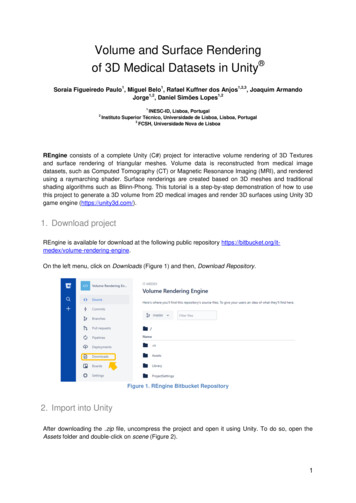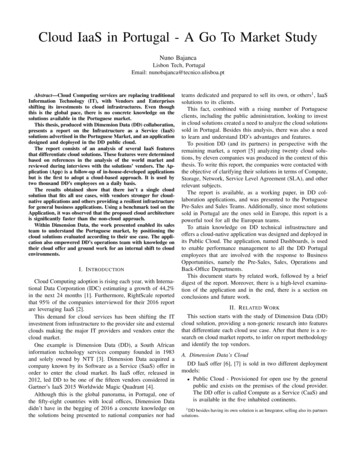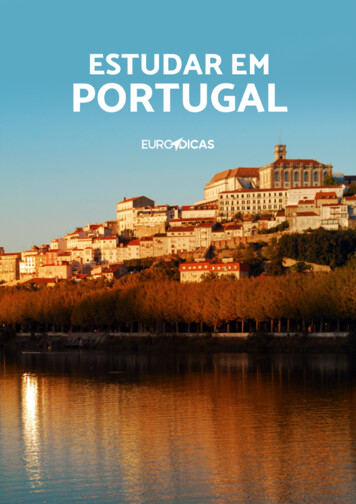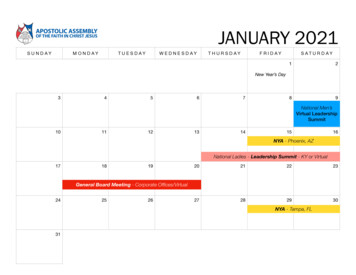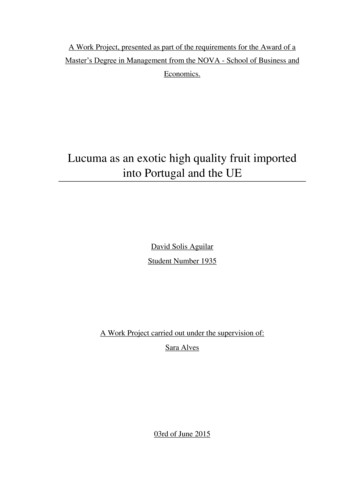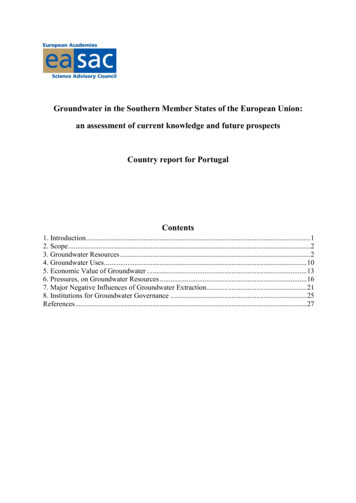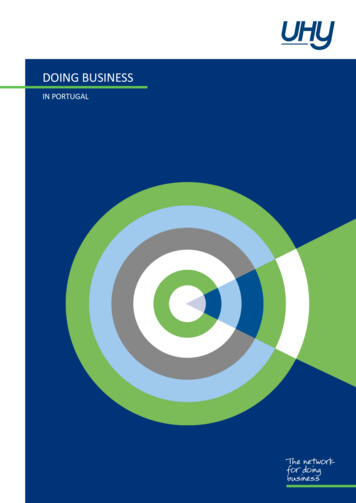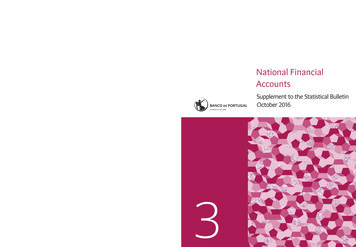
Transcription
PORTUGALPage -1-
TABLE OF CONTENTSSection1Contact Addresses2General3Passport4Money5Duty Free6Public Holidays7Health8Accommodation9Sport & Activities10Social Profile11Business Profile12Climate13History and Government14OverviewPage -2-
1 CONTACT ADDRESSESLocation: Western Europe.Investimentos, Comércio e Turismo de Portugal (ICEP)(Portuguese Trade and Tourism Office)Avenida 5 de Outubro 101, 1050-051 Lisbon, PortugalTel: (21) 790 9500. Fax: (21) 793 5028 or 795 0961.E-mail: dinf@icep.ptWeb site: http://www.portugal.org or http://www.icep.pt orhttp://www.portugalinsite.ptEmbassy of the Portuguese Republic11 Belgrave Square, London SW1X 8PPTel: (020) 7235 5331-4. Fax: (020) 7245 1287 or 235 0739. Opening hours: 1000-1300 Mondayto Friday.Portuguese Consulate2 GENERALSilver City House, 62 Brompton Road, London SW3 1BJTel: (020) 7581 3598 or (0891) 600 202 (recorded visa information; calls cost 60p per minute).Fax: (020) 7581 3085. Opening hours: 0900-1330 Monday to Friday (closed UK and Portuguesepublic holidays).ICEP/Portuguese Trade and Tourism Office2-4th Floors, 22-25a Sackville Street, London W1X 2LYTel: (020) 7494 1441. Fax: (020) 7494 1868. E-mail: iceplondt@aol.comBritish Embassy33 Rua de São Bernardo, 1249-082 Lisbon, PortugalTel: (21) 392 4000 or 392 4160. Fax: (21) 392 4186.E-mail: britembassy@mail.telepac.ptConsulates in: Funchal (Madeira), Oporto, Ribeira Grande (Azores) and Portimão.Embassy of the Portuguese Republic2125 Kalorama Road, NW, Washington, DC 20008Tel: (202) 328 8610. Fax: (202) 462 3726. E-mail: embportwash@mindspring.comConsulates General in: Boston, Honolulu, Houston, Los Angeles, Miami, Newark, New Bedford,New York (tel: (212) 246 4580), Philadelphia, Providence, San Francisco and Waterbury.ICEP/Portuguese Trade and Tourism Office590 Fifth Avenue, 4th Floor, New York, NY 10036-4785Tel: (212) 354 4403/4. Fax: (212) 764 6137. E-mail: tourism@portugal.orgWeb site: http://www.portugal.orgEmbassy of the United States of AmericaAvenida das Forças Armadas, 1600 Lisbon, PortugalTel: (21) 727 3300. Fax: (21) 726 9109 or 727 2354 (consular section).E-mail: conslisbon@state.govWeb site: http://www.american-embassy.ptPage -3-
Consulate in: Ponta Delgada (Azores).Embassy of the Portuguese Republic645 Island Park Drive, Ottawa, Ontario K1Y 0B8Tel: (613) 729 0883 or 729 2922. Fax: (613) 729 4236.E-mail: embportugal@embportugal-ottawa.orgConsulates in: Halifax, Montréal, Québec, St John's, Toronto, Vancouver and Winnipeg.ICEP/Portuguese Trade and Tourism Office60 Bloor Street W, Suite 1005, Toronto, Ontario M4W 3B8Tel: (416) 921 7376. Fax: (416) 921 1353. E-mail: iceptor@idirect.comCanadian EmbassyAvenida da Liberdade 200, 1269-121 Lisbon, PortugalTel: (21) 316 4600. Fax: (21) 316 4695.Consulate in: Faro.Country dialling code: 351.GeneralArea: 92,345 sq km (35,655 sq miles).Population: 9,979,450 (1998).Population Density: 108.2 per sq km.Capital: Lisbon. Population: 3,319,900 (1997).Geography: Portugal occupies the southwest part of the Iberian Peninsula and shares borders inthe north and the east with Spain, while to the south and west lies the Atlantic Ocean. Thecountry is divided into various provinces, including the Atlantic islands of Madeira and the Azores;the latter lying some 1220km (760 miles) due west of Lisbon. The Douro, Tagus and Guadianarivers flow across the border from Spain. North Portugal is mountainous, the highest part beingthe Serra da Estrela, a popular area for skiing. South of Lisbon stretch the vast plains of theAlentejo region. A range of mountains divides the Alentejo from the Algarve, which runs alongthe south coast, and is one of the most popular resort areas with wide sandy beaches andattractive bays.Government: Republic since 1910. Head of State: President Jorge Fernando Branco de Sampaiosince 1996. Head of Government: Prime Minister António Manuel de Oliveira Guterres since 1995.Language: Portuguese. English is widely spoken within the business community.Religion: Roman Catholic.Time: GMT (GMT 1 from last Sunday in March to Saturday before last Sunday in October).Electricity: 220 volts AC, 50Hz. 110 volts in some areas and 220 DC in parts of the south.Continental 2-pin plugs are in use.Communications:Page -4-
Telephone: IDD is available. Country code: 351. Outgoing international code: 00. There are callboxes in most villages and all towns; there are also public telephones in many cafés and bars,from which international calls may be made.Mobile telephone: GSM 900/1800 networks. Operators include Optimus (web site:http://www.optimus.pt), Telcel (web site: http://www.telcel.pt) and TMN (web site:http://www.tmn.pt). Coverage exists across the whole country.Fax: Available at fax bureaux and large hotels in major cities.Internet/E-mail: ISPs include Esoterica, who operate an Internet Access Center, and Telepac,Comnexo and Sonet. Cybercafés exist in all urban areas, and some post offices offer Internetfacilities.Telegram: There are telegram facilities at most major hotels. The public office at Praça dosRestauradores, Lisbon is open daily 0900-1800.Post: Post offices (correios) are usually open 0900-1800 Monday to Friday. Central post officesand those at airports are open Saturday. Airmail to European destinations from continentalPortugal and the Azores takes three days; from Madeira, up to five days. There are posterestante facilities at post offices throughout the country.Press: The English-language newspapers published in Portugal are: Anglo Portuguese News(Lisbon), and The News (Algarve).BBC World Service and Voice of America frequencies: From time to time these change.BBC:MHz12.0959.4106.1953.955Voice of America:MHz15.269.7601.1970.7923 ePassport Required?YesYesYesYes1YesVisa Required?NoYesNoNoNoNoReturn Ticket Required?222222Note: Portugal is a signatory to the 1995 Schengen Agreement. For further details aboutpassport and visa regulations in the Schengen area see the introductory section How to Use ThisGuide.Page -5-
PASSPORTS: Passport valid for up to 6 months (depending on nationality) required by all except1. EU nationals and nationals of Iceland, Liechtenstein, Malta, Norway and Switzerland holdingvalid national ID cards.Note: (a) Passport validity depends on nationality; for nationals of UK, the passport must bevalid for the duration of the stay in Portugal. (b) 2. It is advisable to have a return ticket, but notobligatory. If a visitor is not in possession of a return ticket, proof of sufficient means of supportmay be required.VISAS: Required by all except the following for stays of up to 90 days:(a) nationals referred to in the chart and under passport exemptions above;(b) nationals of Andorra, Argentina, Brazil, Chile, Columbia, Costa Rica, Croatia, Cyprus, CzechRepublic, Ecuador, Hungary, Israel, Korea (Rep. of), Lithuania, Mexico, Monaco, New Zealand,Paraguay, Poland, San Marino, Singapore, Slovak Republic, Slovenia, Switzerland, Uruguay,Vatican City and Venezuela;(c) transit passengers continuing their journey by the same or first connecting aircraft, providedholding onward or return documentation and not leaving the airport. However, nationals ofcertain countries always require a transit visa, even when not leaving the airport transit area;contact the Consulate (or Consular section at Embassy) for details.Types of visa and cost: A uniform type of visa, the Schengen visa, is issued for touristic,private or business visits. There are 3 types of Schengen visa: Short-stay, Transit and AirportTransit. Visas cost between 9.39 and 24.54.Note: A Schengen visa will be issued free of charge to the spouse and children of an EUnational, upon presentation of the original marriage certificate and a valid EU passport. Forchildren, original full birth certificates are required.Validity: Transit visas are valid for single or two entries of maximum 5 days, including the day ofarrival. Visas cannot be extended; a new application must be made each time.Application to: Consulate (or Consular section at Embassy); see address section. Travellersvisiting just one Schengen country should apply to the Consulate of that country; travellersvisiting more than one Schengen country should apply to the Consulate of the country chosen asthe main destination or the country they will enter first (if they have no main destination).Application requirements: Tourism: (a) Passport or official travel documents accepted bySchengen countries, valid for at least 3 months longer than the validity of the visa, with blankpage for attachment of visa sticker. (b) Application form. (c) 1 passport-size photo. (d) Proof ofpurpose of visit in the form of an official letter of invitation from host or business partner,provisional ticket booking and hotel booking where appropriate. (e) Proof of sufficient funds andmedical insurance may also be required. (f) Fee (payable in cash, by postal order). (g) For postalapplications, a large self-addressed envelope stamped for registered or recorded delivery. (h) Forapplicants driving to Portugal, registration document, proof of legal ownership of the vehicle,driving licence and insurance papers. Applicants entering Portugal by land must register with thePolice within 3 days of arrival.Business: (a)-(g), and (h) Letter from employer or, if self-employed, from solicitor, accountant,bank manager or local Chamber of Commerce stating purpose and duration of the visit. Thisshould be faxed to the Consulate in London (fax: 020 7581 3085) at least 48 hours beforesubmitting an application. References may also be required.Working days required: From a few days to a few weeks.Page -6-
Temporary residence: Contact the Consulate (or Consular section at Embassy) for furtherdetails.4 MONEYCurrency: Escudo (Esc). Notes are in denominations of Esc10,000, 5000, 2000, 1000 and 500.The Esc1000 note is known as a conto. Coins are in denominations of Esc200, 100, 50, 20, 10and 5.Single European currency (Euro): The Euro is now the official currency of 12 EU memberstates (including Portugal), although it is currently only used as 'written money' (cheques, banktransactions, credit cards, etc). The first Euro coins and notes will be introduced in January 2002;the Portuguese Escudo will still be in circulation until July 1 2002, when it will be completelyreplaced by the Euro. 1 Euro Esc 200.482Currency exchange: Many banks offer differing exchange rates depending on thedenominations of Portuguese currency being bought or sold. It is common practice for banks tocharge 0.5% commission with a minimum charge of Esc2000 (approximately 9). However, somebanks do not charge any commission on transactions of less than Esc5000. Check with banks fordetails and current rates.Credit cards: MasterCard, American Express and Visa are widely accepted. Check with yourcredit card company for details of merchant acceptability and other services that may beavailable.Travellers cheques: These are readily exchanged. Eurocheques may be used at many banks inconjunction with the appropriate cheque-guarantee card. To avoid additional exchange ratecharges, travellers are advised to take travellers cheques in Pounds Sterling.Exchange rate indicatorsThe following figures are included as a guide to the movements of the Belgian Franc againstSterling and the US Dollar:DateMay '00Aug '00Nov '00Feb'01 1.00 333.35324.99338.42318.74 1.00 224.56216.61233.77218.27The following figures are included as a guide to the movements of the Euro against Sterling andthe US Dollar:DateMay '00Aug '00Nov '00Feb '011 Euro 0.60 0.62 0.59 0.621 Euro 0.89 0.93 0.86 0.92Currency restrictions: The import of local or foreign currency in cash or travellers cheques isunlimited. However, there is an obligation to inform the customs authorities if the values exceedEsc2.5 million (approximately US 13,000,00). The personal export allowance is Esc100,000 cashor (local) travellers cheques, or the equivalent of Esc1,000,000 in foreign currency. This limit maybe exceeded on presentation of proof that the same or a larger amount was imported. There isno limit on the movement of credit cards, cheques or travellers cheques issued outside Portugalin the name of the visitor. The export of gold, silver, jewellery and other valuables is limited to avalue of Esc30,000 and subject to special conditions. For details, contact the Embassy.Banking hours: Generally, 0830-1500 (certain banks in Lisbon are open until 1800) Monday toFriday. In the Algarve, the bank in the Vilamoura Marina Shopping Centre is open daily from0900-2100.Page -7-
5 DUTY FREEVisitors 18 years and older arriving from countries outside the EU may import the following dutyfree goods:200 cigarettes or 100 cigarillos or 50 cigars or 250g of tobacco; 1 litre of spirits over 22% or 2litres of spirits up to 22%; 2 litres of wine; 50g of perfume and 250ml of eau de toilette; 500g ofcoffee or 200g of coffee extract; 100g of tea or 40g of tea extract; further goods up to Esc7500.Abolition of duty-free goods within the EU: On June 30 1999, the sale of duty-free alcoholand tobacco at airports and at sea was abolished in all 15 EU member states. Although there arenow no limits imposed on importing tobacco and alcohol products from one EU country toanother (with the exceptions of Denmark, Finland and Sweden, where limits are imposed),travellers should note that they may be required to prove at customs that the goods purchasedare for personal use only.6 PUBLIC HOLIDAYSJan 1 2001 New Year's Day. Feb 27 Mardi Gras (Carnival). Apr 13 Good Friday. Apr 25 FreedomDay. May 1 Labour Day. Jun 10 Portugal Day. Jun 14 Corpus Christi. Aug 15 Assumption. Oct 5Republic Day. Nov 1 All Saints' Day. Dec 1 Restoration of Independence Day. Dec 8 ImmaculateConception. Dec 25 Christmas Day. Jan 1 2002 New Year's Day. Feb 12 Mardi Gras (Carnival).Mar 29 Good Friday. Apr 25 Freedom Day. May 1 Labour Day. May 30 Corpus Christi. Jun 10Portugal Day. Jun 24* St John's Day. Aug 15 Assumption. Oct 5 Republic Day. Nov 1 All Saints'Day. Dec 1 Restoration of Independence Day. Dec 8 Immaculate Conception. Dec 25 ChristmasDay.Note: (a)*Lisbon only. (b) Holidays falling on a Sunday are not observed on the followingMonday.7 HEALTHYellow FeverCholeraTyphoid and PolioMalariaFood and DrinkSpecial PrecautionsNoNoNoNoNoCertificate Required1No-1.: A yellow fever vaccination certificate is required from travellers over one year of age arrivingin (or destined for) the Azores or Madeira, if coming from infected areas. However, no certificateis required from transit passengers at Funchal, Porto Santo and Santa Maria.Health care: There are full state-provided health facilities, but private practices are allowed tocoexist. There are approximately 28,769 doctors and 38,654 hospital beds. There are reciprocalPage -8-
health agreements with most European countries. The agreement with the UK allows free inpatient treatment in general wards of official hospitals to those presenting UK passports (otherEU nationals must present form E111). Secondary examinations, X-rays and laboratory tests mayhave to be paid for. A nominal charge will be made for medical treatment at health centres(Centro de Saúde). There may be a charge for prescribed medicines. All dental treatment mustbe paid for. This agreement is also effective in Madeira and the Azores (although in Madeira a feemust be paid for a GP consultation, which can then be refunded by an appointed bank). Thosewishing to take advantage of it should inform the doctor prior to treatment that they wish to betreated under EU social security arrangements. Private treatment must be paid for in full. Medicalfees paid whilst in Portugal cannot be reimbursed by the British NHS.Travel - InternationalAIR: Portugal's national airline, TAP Air Portugal (TP), operates direct flights to Lisbon, Porto andFaro from a number of countries, including the UK, USA, Canada, France and Spain. PortugáliaAirlines (NI) operates flights from Europe. Other airlines flying to Portugal from the UK are BritishAirways, Go and GB Airways.Approximate flight times: From Lisbon to London is 2 hours 30 minutes and to New York is 8hours.International airports: Lisbon (LIS) (Portela de Sacavem) (web site: lisboa.htm) is 7km (4.5 miles) north of the city (travel time 35 minutes). Greenline Bus, nos. 44, 45 and 83, runs every 15 minutes from 0530-0100 to thecity centre and main railway station. A special 'Airbus' departs to the city centre every 20minutes. Taxi services to the city are available, with a surcharge after 2200. Airport facilitiesinclude 24-hour bureau de change, tourist information (0600-0200), duty-free shops (0700-0130)and car hire (Avis, Eurodollar, Inter-Rent and Hertz).Faro (FAO) (web site: htm) is 4km (3miles) west of the city (travel time - 30 minutes). Bus nos. 17 and 18 go to the city; taxis areavailable.Oporto (OPO) (Oporto Sá Carneiro) (web site: htm) is 11km (about 7 miles) from the city. Taxis to the cityare available.Faro and Oporto airports both have the following airport facilities: outgoing duty-freeshop; bank/bureau de change (open normal banking hours); car hire and a restaurant/bar.Departure tax: None.SEA: The principal ports for international passengers are Lisbon, Leixões (Oporto), Funchal(Madeira) and Portimão (Algarve), served by P&O, Union Castle, Olympia, Linea C, Cunard andItalia. For details, contact shipping lines.RAIL: Travelling from the UK, the quickest way is to travel by Eurostar through the ChannelTunnel to Paris (travel time - 3 hours) and, from there, to Portugal. The 'Sud-Express' runsbetween Paris and Lisbon, offering first- and second-class seats, sleepers and a restaurant car.For further information and reservations contact Eurostar (tel: (01233) 617 599 (travel agents) or(0990) 186 186 (public; within the UK) or (01233) 617 575 (public; outside the UK only); website: http://www.eurostar.com); or Rail Europe (tel: (08705) 848 848). Travel agents can obtainrefunds for unused tickets from Eurostar Trade Refunds, 2nd Floor, Kent House, 81 Station Road,Ashford, Kent TN23 1PD. Complaints and comments may be sent to Eurostar Customer Relations,Eurostar House, Waterloo Station, London SE1 8SE. General enquiries and information requestsmust be made by telephone. Rail travellers from the UK not using the Channel Tunnel link needPage -9-
to cross the channel via some form of sea crossing, usually by ferry or catamaran; for details onsea crossings see also under Sea above. The cost of the crossing is usually included in the priceof the rail ticket. There is a daily service between London, Paris and Lisbon, taking approximately26 hours.ROAD: The only land border is shared with Spain, and there are seven frontier posts in the northand six on the western and southern border. Border posts are usually open 0700-midnight, butclose earlier in winter. From the UK, the quickest routes are via the ferry links from Plymouth toSantander and from Portsmouth to Bilbao in northern Spain (which obviates the need to drivethrough France). Cars can be imported for up to six months. For information on documentationand regulations, see the Travel - Internal section. Travelling from the UK, all road vehicles arecarried through the channel tunnel in Le Shuttle trains (journey time - 35 minutes through thetunnel). For further details, see also Travel International in the France section. For informationand reservations contact Eurotunnel Customer Services in the UK (tel: (0990) 353 535). Forinformation on required documentation and traffic regulations see Travel - Internal section.Coach: Eurolines operates an extensive network of coach services to many destinationsthroughout Europe, including Coimbra, Faro, Lisbon, Lagos and Oporto. For information ontimetables and fares, call Eurolines in the UK (tel: (08705) 143219; web site:http://www.eurolines.co.uk).Travel - InternalAIR: TAP Air Portugal and Portugália run services between Lisbon, Faro, Madeira, Porto Santo,Oporto and the Azores. Charter flights are also available. The airline for the Azores is SATA(Sociedade Acoriana de Transportes Aereos), which operates its service Air Açores, between thevarious islands.SEA/RIVER: Transport is available from all coastal ports and along the major rivers. For details,contact local ports.RAIL: Caminhos de Ferro Portugueses (Portuguese Railways) provides a rail service to everytown. The tourist areas of Cascais and Sintra are connected to Lisbon by frequent express trains.Cheap fares: On 'Blue Days', usually Monday afternoon to Thursday, special rates are available.There are also special fares (with 20-30% reductions) for groups of ten or more (Bilhetes deGrupo), travelling for a minimum distance of 75km/47 miles (single journey) or 150km/94 miles(return journey). Application should be made four days in advance by the group leader. TouristTickets (Bilhetes Turisticos) for 7, 14 or 21 days of unlimited travel are also available. The RailCheque (Cheque Trem), obtainable in four different values, can be in one name or a company'sname and has no time limit; it gives a reduction of 15% and can be used both for purchasingtickets and many other railway services.An International Youth Ticket (BIJ) entitles those aged 12-26 to a discount (subject to certainconditions) in 25 countries, including Portugal.Senior citizens are entitled to 50% reduction on production of proof of age. Children under 4travel free. Children aged 4-11 pay half fare.Family Card, Inter-Rail Card, Rail Inclusive Tours, Euro Domino and Special Tourist Trips areamongst other offers from the Portuguese Railways (Caminhos de Ferro Portugueses), Calçadado Duque 20, 1294 Lisbon Codex (tel: (21) 346 3181; fax: (21) 347 6524; web site:http://www.cp.pt). Rail information is also available from ICEP (Portuguese Trade and TourismOffice); see address section.ROAD: Traffic drives on the right. Every town and village can be reached by an adequate systemof roads. Petrol stations generally stay open 0700-2000, although some are open 24 hours.Page -10-
Travel by motorway is subject to a toll according to distance covered and type of vehicle. A smalltax may be added to petrol bought with a credit card. Taxi: Charges are according to distanceand taxis are all metered. Taxis are usually painted beige (although some taxis painted in the oldcolours of green and black still exist). In the city they charge a standard meter fare; outside thecity limits they charge per kilometre and are entitled to charge for the return fare. There is asurcharge for carrying luggage in the cities. Car hire: Available from main towns and airports,with or without driver. Regulations: Minimum age for driving is 21. Cars may be imported for upto six months. Traffic signs are international. Headlights should be dipped in built-up areas andside lights used when parking in badly-lit areas. Children should not travel in the front seat. Seatbelts should be worn. Warning triangles are compulsory. It is forbidden to carry cans of petrol invehicles. Speed limits are 50kph (30mph) in built-up areas, 90kph (56mph) outside built-up areasand 120kph (70mph) on motorways. Visitors who passed their driving test less than one yearpreviously must display a yellow disc with '90' on it on the rear of their vehicle and must not gofaster than 90kph (56mph) (or lower where appropriate). Permitted speeds will vary if trailers arebeing used. Documentation: International Driving Permits or foreign driving licences areaccepted. Third Party insurance is compulsory and a Green Card must be obtained. Under therequirements of the Portuguese Road Code, those wishing to drive a car must possess a validnational/international driving licence, other official documentation with photograph, log book orrental contract and adequate car insurance. Failure to produce, on request to the authorities, anyof the above will result in an on-the-spot cash fine. A Carnet de Passage is needed for a van.URBAN: Lisbon has an underground (Metropolitano), which is currently being expanded. Tramsalso operate in major Portuguese cities. A tram ride in Lisbon also provides a good opportunity tosee the city. Cheap fares: In Lisbon, a Tourist Pass is available for either 4- or 7-days travel ontrams, buses and the underground. The Lisboa Card (for sightseeing) is valid for 24 or 72 hoursand offers unlimited bus, tram and underground travel as well as entry to 26 museums and 50%discounts to other cultural attractions.JOURNEY TIMES: The following chart gives approximate journey times (in hours and minutes)from Lisbon to other major cities/towns in the Portuguese 3.00Funchal1.30--8 ACCOMMODATIONThere is a wide range of accommodation available all over the country, ranging from luxuryhotels, pensions, boarding houses and inns to simple guest-houses, manor houses, campsitesand youth hostels. The government-run pousadas offer very good value and are often situated inplaces of scenic beauty in converted castles, palaces or old inns.HOTELS: Most hotels have a private swimming pool and serve international cuisine as well assome typically Portuguese dishes. During the low season, hotels normally grant substantialreductions. There should be an officially authorised list of prices displayed in every bedroom, andchildren under eight years of age are entitled to a reduction of 50% on the price of full meals and50% on the price of an extra bed - if sharing parents' room or apartment. Further informationcan be obtained from the Associação Hotéis de Portugal, Avenida Duque d'Ávila 75, 1000 Lisbon(tel: (21) 357 0458; fax: (21) 357 0485). Grading: Classification of hotels is according to theinternational 1- to 5-star system and their prices are officially approved. Apartment hotels arePage -11-
classified from 2- to 4-star, motels from 2- to 3-star and boarding houses from 1- to 4-star; thereare also 4-star albergarias.POUSADAS: The pousadas are a network of inns operated by the Government, and housed inhistoric buildings, castles, palaces and convents, or sometimes built especially for the purpose.They have often been geographically sited in regions not on the usual tourist itinerary to givepeople the opportunity to visit the whole country. The architecture and design of the pousadashas been carefully studied in order to give visitors a better knowledge of the cultural traditions ofthe various regions of the country, with particular attention paid to handicrafts, cooking andwines. A guide to pousadas can be obtained from ENATUR, Pousadas de Portugal, Avenida deSanta Joana-a-Princesa 10, 17499-090 Lisboa (tel; (21) 844 2001, fax; (21) 844 2085).PRIVATE HOUSES: Rooms are available in private houses and on farms all over Portugal. Someof the old manor houses are now open to visitors and provide good opportunities for tourists tomake contact with Portuguese customs and people. For further information, contact ICEP or localtravel agents.SELF-CATERING: There is self-catering tourist accommodation in deluxe, first- and secondclass tourist villages and tourist apartments, particularly on the Algarve. Tour operators canarrange a wide variety of villas for self-catering parties.YOUTH HOSTELS: Youth hostels are located to give young people the opportunity of visitingtowns, countryside, mountains and coastal areas. Tourists from 14-40 years of age can obtainaccommodation and meals. For further information, contact MOVIJOVEM, Avenida Duque d'Avila137, 1069 Lisbon 017 (tel: (21) 359 6000; fax: (21) 359 6001; e-mail:movijovem@mail.telepac.pt; web site: http://www.sej.pt).CAMPING/CARAVANNING: Portugal provides camping and caravan parks near beaches and inthickly wooded areas. Some have model installations including swimming pools, games fields,supermarkets and restaurants. A guide published by the ICEP and DGT give the names ofexisting parks and details of their classification, equipment and capacity. For further information,contact Federação Portuguesa de Campismo, Avenida Colonel Eduardo Galhardo 24D, 1170Lisbon (tel: (21) 812 6890; fax: (21) 812 6918; web site: http://www.roteiro-campista.pt).Porto e Norte de PortugalThere are seven major tourist regions in Portugal. These are: Porto e Norte de Portugal,Beiras, Lisboa e Vale do Tejo, Alentejo, the Algarve, Madeira and the Azores.Note: There are separate sections on Madeira and the Azores. For more information, see theindividual entries.Porto e Norte de Portugal is the region occupying the north of Portugal starting at the northernborder with Spain and stretching south of Porto as far as the eastern Spanish border. Itencompasses the rivers Minho, Lima and Douro together with the Peneda-Gerês National Park.Some places have become 'touristy', but along the coast and in the countryside you can still findquiet areas. The vicinity of Oporto is the home of the famous Port wine. There are also naturalspas in this area. The coastal area is well covered by maritime pine forests. There are goodbeaches in many of the resorts between Espinho and the mouth of the Minho River. Away fromthe beaches, through the Minho and Douro Valley, there is plenty of interesting local life to see.Oporto: Oporto (Porto) is the second-largest city in Portugal and the major town in the north.Oporto prospered under the Romans and was the birthplace of Prince Henry the Navigator, aPage -12-
driving force behind the great maritime discoveries of the 15th and 16th centuries. A tradingagreement with England in 1703 bought wealth to the town and saw the start of the famous Portwine trade. At the wine lodges in the area, visitors are always welcome.Póvoa de Varzim: Póvoa de Varzim, 28km (17.5 miles) north of Porto, is an old and stillimportant fishing port. In recent years, the town has become an elegant and popular sea
E-mail: iceptor@idirect.com Canadian Embassy Avenida da Liberdade 200, 1269-121 Lisbon, Portugal Tel: (21) 316 4600. Fax: (21) 316 4695. Consulate in: Faro. Country dialling code: 351. General Area . driving licence and insurance papers. Applicants entering Portugal by land must register with the Police within 3 days of arrival. .
